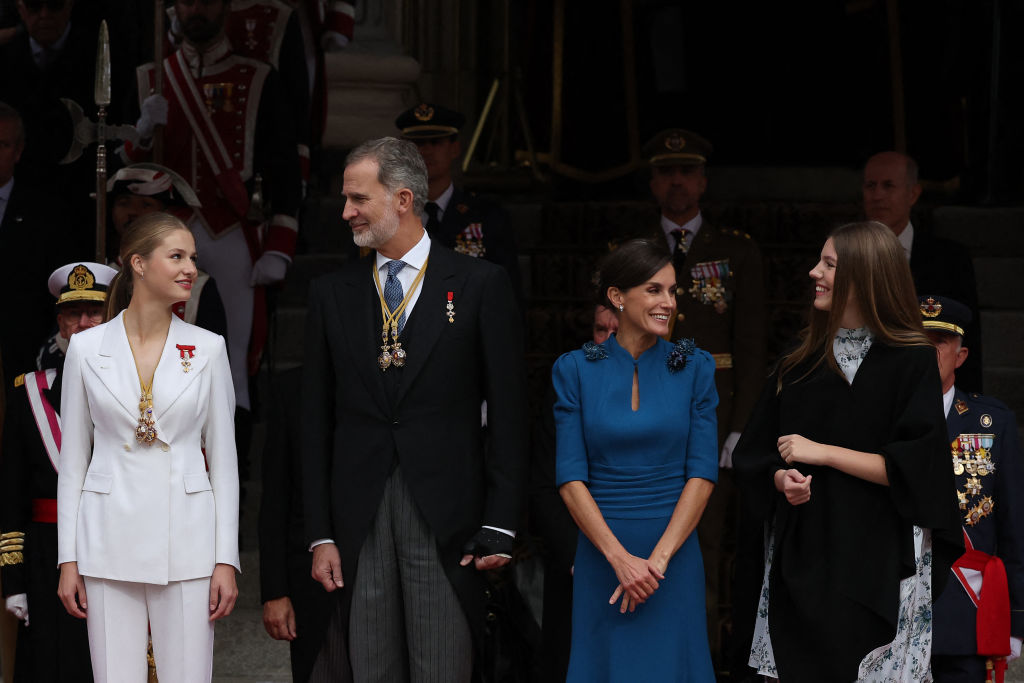‘We, who are as good as you, swear to you, who are no better than us, to accept you as our king and sovereign lord, provided you observe all our laws and liberties; but if not, not.’
This famous oath of allegiance, sworn hundreds of years ago by the noblemen of Aragon in northern Spain to their king, also neatly expresses the transactional attitude of many contemporary Spaniards to their monarchy. They were willing to accept the restoration of the Bourbon dynasty as part of the post-Franco democratic settlement provided the king deserved their loyalty – but if not, not.
And for many, the alleged misdemeanours (personal and financial) of ex-King Juan Carlos mean that he broke that covenant and so forfeited his right to their loyalty. Trust in the monarchy – as high as 75 per cent in 1995 – fell to 37 per cent in 2013. So it came as no surprise when in 2014, after reigning for 38 years, Juan Carlos abdicated in favour of his son, Felipe. Things got even worse when the new king’s brother-in-law was imprisoned after investigations into his business activities.
Many Spaniards, especially the young and middle-aged who have no memory of how in 1981 Juan Carlos faced down the attempted military coup that threatened to overthrow Spain’s fledgling democracy, feel little loyalty to the monarchy. While perfectly content to accept governance from unelected European Union officials, they resent having an unelected head of state – even though his duties are mostly ceremonial.
Although King Felipe has worked hard to restore trust, anti-monarchical sentiment was again visible on Tuesday when his daughter and heir-to-the-throne, Princess Leonor, whose 18th birthday it was, stood before parliament and swore allegiance to the constitution. When Felipe himself did this in 1986 the presidents of both the Basque and Catalan regions were present, as protocol required. This time, however, they and other regional representatives were conspicuous by their absence.
This display of republican sentiment came as no surprise. While the Basque separatist party, Bildu, was content to simply repeat that it does not recognise the legitimacy of the Crown, Galician nationalists explained why: it was the dictator Franco who named Juan Carlos as his successor. ERC, one of the two main Catalan separatist parties, recently described the monarchy as ‘a corrupt, secretive and undemocratic anachronism’. Members of the radical left-wing party Sumar made very similar observations.
But the political parties that would like Spain to become a republic are in a minority. The 31 seats Sumar won in the July general election, together with the 26 these regional parties managed between them, give the anti-monarchists a total of just 57 seats in parliament. In contrast, the three biggest political parties – the left-wing PSOE and the right-wing PP and Vox – which all support the monarchy hold a total of 291 seats.
In theory then King Felipe can sleep easy. The problem however is that Pedro Sánchez, leader of PSOE and Spain’s acting prime minister, is trying to form a new government. Since his party only won 121 seats in July’s general election, he needs the support of the anti-monarchists to reach the total of 176 votes required for a majority in a parliament of 350 seats.
If, as seems likely, Sánchez eventually manages to cobble together this alliance, he will find the anti-monarchists noisy and uncomfortable bedfellows who seize every chance to disrespect King Felipe and agitate to put abolition of the monarchy on the agenda. And if times should happen to be hard, that anti-monarchical sentiment is likely to resonate with the electorate: a poll during the pandemic suggested that more Spaniards want their country to be a republic than want it to be a monarchy.
Hopefully, the intelligent, hard-working Felipe VI will continue to prove that he deserves his people’s loyalty. His ancestor, Ferdinand VII, who reigned in the early nineteenth century, was prophetic when he likened the monarch to a cork in a bottle of beer: as soon as that cork is removed, he said, all the troubles of Spain will explode into the open. So far history has suggested that he was right. The First Republic (1873-74) was a brief and disastrous affair, while the Second Republic lasted for five chaotic years before civil war broke out in 1936. Who knows what a Third Republic would bring?






Comments